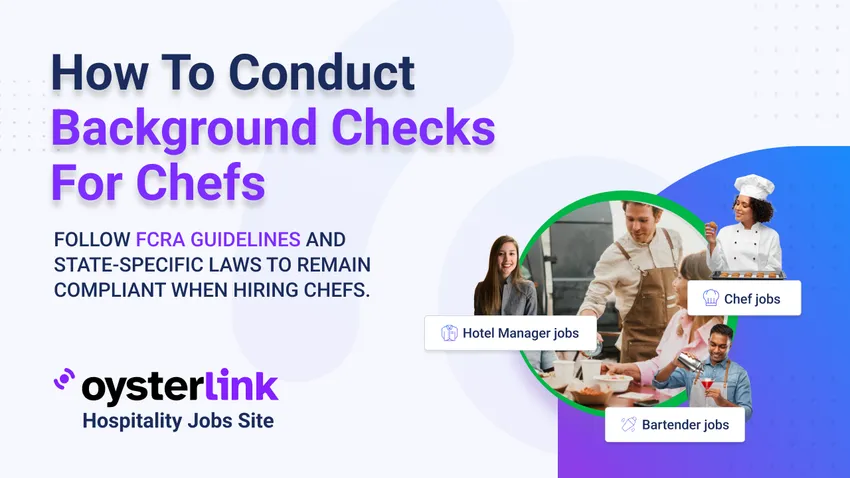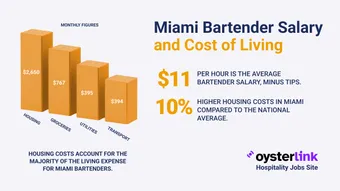How To Conduct Background Checks for Chef: Key Takeaways
- FCRA mandates clear disclosure, written consent, and specific steps before and after adverse employment decisions.
- State laws, including “Ban the Box” and other restrictions, may limit when and how criminal history is considered.
- Employers should implement written policies, train HR staff, and keep all candidate data confidential.
Conducting background checks for chefs requires compliance with federal and state laws to avoid legal pitfalls.
This guide outlines key FCRA steps and state considerations to protect employers and candidates.
Learn more about restaurant background checks and common practices across the industry.
1. FCRA Requirements for Chef Background Checks
The Fair Credit Reporting Act (FCRA) governs how employers conduct background checks when hiring chefs or any employees.
FCRA’s goal is to protect applicants’ privacy and ensure transparency during the screening process.
Key steps under the FCRA include:
- Disclosure and Authorization: Before running a background check, employers must provide candidates a clear, standalone written disclosure explaining that a background check will be performed for employment purposes and obtain their written consent.
- Pre-Adverse Action Process: If information from the background check could negatively impact the hiring decision, the employer must notify the candidate with a pre-adverse action notice. This includes a copy of the report and a summary of their rights to dispute inaccuracies.
- Adverse Action Notification: After a final decision to reject or alter employment based on background check results, the employer must send an adverse action notice including the agency’s contact information and the candidate’s rights to dispute the report's content.
Ensure your screening workflow aligns with evolving job posting compliance requirements across jurisdictions.
2. State Laws Compliance For Checking Chef Backgrounds
Besides FCRA, various states and localities have their own rules regulating background checks.
One major consideration is “Ban the Box” laws, which restrict when employers can inquire about criminal records during the hiring process.
This often means employers cannot ask about criminal history on initial job applications or during early interview stages for chef positions.
If you plan to hire a top chef, make sure your process reflects these local restrictions.
Other state-specific regulations may restrict how far back employers can look at criminal records, what types of offenses can be considered, or require additional notices to candidates.
Because state background check laws vary widely, it is crucial to consult the relevant state labor department or legal counsel before conducting checks.
Use structured chef interview questions alongside compliant screening to make balanced decisions.
Ban the Box Laws’ Impact on Chef Hiring
“Ban the Box” aims to give candidates with criminal records a fairer chance at employment by delaying these questions.
Employers hiring chefs need to be aware if their state or city enforces these laws and adjust applications and interview practices accordingly.
For leadership roles, pair fair-chance policies with targeted executive chef questions to assess decision-making and oversight.
Examples of State-Specific Background Check Rules
- Some states only allow consideration of felonies and exclude misdemeanor offenses.
- Others require disclosure or written permission notices beyond what FCRA mandates.
- Certain states prohibit discrimination based on certain old convictions or require individualized assessments.
For broader staffing needs, use templates to hire kitchen staff efficiently and consistently.
3. Best Practices for Chef Background Checks
To reduce risk and ensure compliance, employers should take several proactive steps.
Develop a Clear Background Check Policy
Create a written internal policy detailing how and when background checks are performed for chef positions, how candidate privacy is protected, and how results impact hiring decisions.
Align your policy with the core chef job description and responsibilities.
Train HR Staff on FCRA and State Requirements
Human resources personnel or hiring managers should be educated on all applicable laws to avoid common mistakes, such as failing to obtain proper consent or providing incorrect notices.
Provide hiring teams with structured sous chef questions to keep evaluations consistent and role-specific.
Maintain Strict Confidentiality of Background Information
Background check reports contain sensitive personal data that must be securely stored and only shared with authorized staff involved in the hiring process.
Any unauthorized disclosure can violate privacy laws and expose the employer to liability.
4. Summary and Additional Government Resources
Conducting background checks for chefs involves careful adherence to the FCRA and various state laws.
Employers must provide clear disclosures, obtain consent, follow pre-adverse and adverse action procedures, and comply with local restrictions like Ban the Box laws.
By maintaining written policies, training staff, and handling all information confidentially, employers can minimize risks and hire fairly and legally.
When you are ready to expand your team, you can post a chef job to reach qualified candidates.
- Fair Credit Reporting Act (FCRA)
- U.S. Equal Employment Opportunity Commission (EEOC) Guidance on Background Checks
- U.S. Department of Labor - Hiring and Employment









Loading comments...